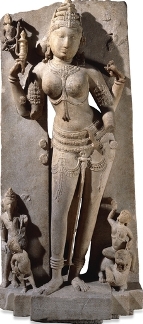kahA kahUM ratiyA kI kathA batiyA kahi Avata hai na kacHU rI
Ayi gopAla liyo bhari a~Nka kiyo mana bhAya piyo rasa kU rI
tAhI dinA soM gaDI aMkhiyAM rasakhAni mere a~Nga a~Nga me pUrI
pai na dikhA.i parai aba bAvari dai ke biyoga bithA kI majUrI
(prema-vATikA.114)
{How do I describe that night dear, for words are escaping my tongue;
gopAla came, took me in his embrace, did what he liked, and we tasted the nectar;
And since that day, as if every pore of rasakhAn’s body has become eyes, waiting for him –
As he has not returned since, and I am left with this gift of his, this madness, this pain, this agony…}
The recent discussions on homosexuality brought to our mind that great poet of braja-bhAShA, Syed Ibrahim Piyani turned vaiShNava sAdhu rasakhAna, for whom his homosexuality itself had become the vehicle to reach kR^iShNa-devotion.
There are of course many unknown things about rasakhAna, including his parentage and early life, and we have no intentions to go into much of those details, in brief what stands almost certain from internal evidence of his own writings is that he was a homosexual, was a paThAna, used to live in dillI, and most scholars of Hindi history consider him a contemporary of Akbar. We however feel that he was an old man by the time of Akbar, and must have rather seen those times when himU had suppressed the last of Afghans and was crowned in dillI. (We have seen some hints of its mention in a couple of his lines, but that will require more analysis.)
The vaiShNava hagiography by gokuladAsa called ‘dosaibAvana vaiShNavan kI vArtA’ (Discussion on 252 vaiShNava-s) recounts the life of rasakhAna, and provides some details about rasakhAna’s homosexual beginning and how through it he turned to devotion. Reproduced below is the relevant part of the prose (#218):
“so vA dillI me eka sAhUkAra rahato hato | so vA sAhUkAra ko beTo baDo sundara hato vA cHoro so rasakhAna ko mana laga gayo | vAhI ke pIcHe phiryA karai vAko jhUTo khAve ATha pahara vAhI kI naukarI karai |… eka dina chAra vaishnava milaki bhagvadvArtA karate hate | karate karate aisI bAta nikasI jo prabhu me aisa lagAvanA jaise chitta sAhUkAra ke beta me lagyo hai…”
In summary, he used to live in dillI and been in homosexual relationship with a certain vaishya’s son, with whom he used to spend day and night and the story of their scandalous affaire was well known in the town. Once he was passing by a group of vaishnava sAdhu-s and got curious overhearing their discussion. (One sAdhu said that one must develop love for the Lord like this paThAna loves that vaishya boy). His curiosity drew him to them and when he asked he was shown a picture of kR^iShNa in shrI-nAtha form (some other descriptions mention it in muralI-manohara form, although little difference it makes). The image was so attractive that rasakhAna’s heart was immediately struck by its beauty, and he fell in love, as rasakhAna himself says in one of the dohA-s recorded in prema-vATikA: ‘prema-deva kI cHabi lakhi, bhaye miyA rasakhAna’ – one glance at the image of the Lord of Love, and miyA became rasakhAna.
He then visited vR^indAvana, and started roaming around in the company of vaiShNava vairAgI-s, eventually taking dIkShA in puShTi mata from the son of famous vallabhAchArya, composing and singing love songs for his new love, and eventually becoming the famous rasakhAna. His poems are mostly in the savaiyyA meter, and present an entirely unique strain of devotion. Above all, one can find such expressions in his work that would easily remind one of his homosexual beginnings.
It seems Moslems did not take kindly to his conversion, and some complained against him with the emperor (Akbar?), although there is no mention of any persecution of rasakhAna except for this line that he wrote: “kahA karai rasakhAna ko ko.U chugala-labAra | jo pai rAkhana-hAra hai mAkhana-chAkhana-hAra” (What harm can these petitioners bring to rasakhAna, for his protector is now none lesser than kR^iShNa himself.)
According to janaShRuti, towards the end of his life he once heard a recitation of rAma-charita-mAnasa (which must have been composed just recently by young tulasIdAsa), and took to its reading and hearing very lovingly.
His immortal, famous last-wish:
mAnusa hauM tau vahI rasakhAna basauM mili gokula gaoM ke gvArana
jo pasu hauM tau kahA basu mero charauM nita nanda kI dhenu majhArana
pAhana hauM tau vahI giri kau jo dharyo kara cHatra purandara kArana
jo khaga hauM tau basero karauM mili kAlindI kUla kadamba kI DArana
(If reborn as a human, then wish to be reborn as rasakhAna, living among those shepherds of gokula;
And if I have to be reborn as an animal, for what control do I have in it, then wish to be born as a cow that would graze together with the cows of nanda;
And if I be sent as a stone, then let me be on that hill, which my Lord picked up due to the wrath of purandara;
And if I become a bird, then I wish I shall make home on the branches of those kadamba trees that grow on the banks of holy yamunA)
bhAratendu records about rasakhAna in his uttara-bhaktamAla, and counting him among other moslem-turned-Hindu devotees, he ecstatically concludes: “ina musalmAna harijanan pai koTina hinduna vAriye”: (the gain of such hari-jana musalmAns makes cheaper to me the loss of a million Hindus.)

